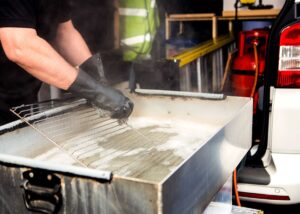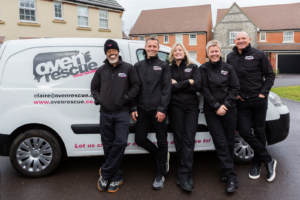What is a Franchise Business?
The decision between buying a franchise and starting your own business can be a tricky one. Whilst start-up costs can be steep, many people simply like the appeal of starting their own business.
However, franchises in the UK are currently thriving, with over 710,000 employees and 93% of franchisees claiming profitability. And with the industry continuing to grow, now is one of the best times to invest in a franchise.
So – what exactly is a franchise? How does it work? And what are some of the most popular franchise businesses operating in the UK? This guide covers all of this and more.
What is a franchise?
A franchise is a unique business arrangement where an entrepreneur (franchisee) operates a business using the trademarks, branding, and business model of another successful business (franchisor).
A franchise is a business that allows other people to sell their products or services under the same name. This comes under a form of legal licence.
As a result of providing their business name, products, and knowledge to others, the owner receives fees from start-ups and annual licensing.
The two main parties in a franchise business are the:
- Franchisor – the party that owns the rights to the business and its name, products, and services; and,
- Franchisee – the party that buys the rights to operate under the same business name as the franchisor.
Why do businesses choose to franchise?
Franchising is a strategic business model that empowers individuals to own and operate their own businesses under an established brand. It is a symbiotic relationship where the franchisor provides a proven business model, training, and ongoing support, while the franchisee leverages this foundation to build a thriving enterprise.
There are a number of key reasons why larger business choose to franchise and expand their business:
- Streamline growth – partnering with franchisees allows businesses to open many locations across the country, particularly in areas that they could not reach before.
- Increased brand visibility – with growth comes visibility. Franchising allows businesses to reach new markets, introducing the brand to customers who were unaware of them before.
- Lower barrier to entry – franchising requires less investment as franchisees invest their own capital to expand the business, meaning there is less risk for the franchisor.
How does a franchise work?
Once a franchisee invests in a franchise business, they gain the right to use the business’s name for a time specified in the initial contract. Importantly, this means that the franchisee never has full ownership of their business, making it similar to leasing instead.
Alongside this investment comes assistance from the franchisor themselves, although the level of help depends on what was initially agreed upon.
Typically, a franchisee will receive help with basic training, relocation, business advisory, and marketing. However, many also offer websites or workshops that can further aid their sales.
For example, a franchise like Oven Rescue provides adequate training to all new franchisees, alongside all the relevant equipment they will need to carry out their job. We also advertise all franchisees on our website by area.
Control of the franchisor
Whilst the franchisee will run their specific franchise, the franchisor still has some control over the everyday running of the business, including:
- the design and appearance of the business;
- the products or services it sells; and
- when, where, and how it operates.
On top of this, the franchisor has the right to terminate the franchise contract for several reasons, including issues with performance or payment.
How much does a franchise cost?
There are three main costs that come with buying a franchise business.
1. Initial franchise and start up fees
When investing in a franchise, the franchisee needs to make a one-time payment to the franchisor in order to start selling under their name. This payment is typically used to combat the franchisor’s start-up fees for a new franchise, alongside any other relevant costs that come with it.
2. Ongoing royalty fees
A royalty fee is a consistent payment that franchisees make to the franchisor based on a percentage of their weekly or monthly earnings. It is regularly calculated as a percentage of their gross sales, and sits between 5 to 10%. However, some franchisors may instate a minimum or fixed fee instead.
3. Marketing and advertising fees
Some franchise businesses require an advertising fee from the franchisee to promote them across their social and retail channels. These usually go hand in hand with royalty fees on a weekly or monthly basis, and are typically calculated on a percentage of gross sales.
Advantages of a franchise
There are many advantages to investing in a franchise, especially for budding entrepreneurs looking to invest in their next business venture.
- Brand awareness – as the business already has an existing customer base, people are already familiar with the brand. The hardest part of setting up a new business is attracting customers, and investing in a franchise essentially skips this difficult step.
- Supportive structure – franchises receive support not just from the franchisor, but from other franchises too. Franchise businesses like Oven Rescue cultivate a family of oven cleaning professionals, constantly offering advice and support to each other.
- Market tested – franchisees do not need to worry about the success of their product or service as the business would have taken this into account during their original set up. This allows the franchisee to simply sell to the customer without worrying about how they perceive the product or service.
Five well-known franchise examples
As of November 2022, there are over 48,000 franchise businesses throughout the UK. Many of them are lesser known to the average person, but there are several companies that are infamous for their franchise business model. Here are five of the most popular franchises in the UK and their respective attributes:
1. McDonalds
With more than 38,000 locations worldwide, McDonalds is the largest franchise business on the planet, with restaurants situated in over 100 countries. McDonalds keeps franchises up to date with consistent changes to their menu and technology, making it the top name in the industry.
How much is a McDonald’s franchise?
Businesspeople looking to invest in a McDonald’s franchise can easily spend upwards of £800,000 as a start-up cost, requiring at least £150,000 in liquid assets too. Whilst you can expect an average cash flow of up to £550,000 after the first year, this franchise clearly requires a lot of initial investment which many people in the UK simply do not have.
2. Subway
Subway is one of the largest fast-food sandwich chains in the world and has over 2,500 franchises dotted around the UK. It is clearly a successful business model due to its high demand and consistent opening of new locations.
How much is a Subway franchise?
Starting up a Subway franchise can cost anywhere from £80,000 to £225,000. This comes with an 8% monthly royalty and 4.5% advertising fee. Similar to McDonalds, this is simply not a feasible option for many people in the UK, due to its high cost of entry.
3. Starbucks
With over 1,156 stores in the UK, and 838 being franchises, Starbucks clearly operates successfully under the franchise business model. It is the largest coffee franchise in the world with a name that is almost synonymous with the drink.
How much is a Starbucks franchise?
In the UK, franchisees can expect to need at least £500,000 in liquid assets, alongside strong financial capabilities to support it. Whilst this will likely bring in good profits, the steep financial input is hard to look past.
4. Greggs
Greggs is one of the most popular bakery chains in the UK, with 2,050 shops and over 300 of them being franchises. The food chain typically partners with companies that own petrol stations, service stations, or shopping centres, allowing for an easy place to implement a shop.
How much is a Greggs franchise?
The start-up fee for a Greggs ranges from £30,000 to £45,000, alongside investments of up to £250,000. However, unlike other popular franchises, Greggs currently does not partner with franchisees for single shop purchases, instead opting for buyers looking to open at least 10 shops across a given period.
5. The Travel Franchise
The Travel Franchise is a travel agency business that allows aspiring entrepreneurs to become a travel agent from home. With over 900 partners worldwide, it offers opportunities for those looking to work from home and around their other commitments.
How much does The Travel Franchise cost?
Start-up costs for franchises under The Travel Franchise range from £2,995 to £29,995, depending entirely on the package you choose. Whilst the costs are substantially lower than other brands, the business is incredibly seasonal and success is weighted heavily towards the warmer times of the year.
The issues with popular franchises
The common denominator between many of these popular franchise businesses is their hefty start up costs. Alongside an initial investment, many require a large sum of liquid assets to accompany and support their purchase, making the cost of entry incredibly high.
Similarly to The Travel Franchise, franchises like Oven Rescue have much lower cost of entry, whilst also being prevalent all year round unlike the former. Find a franchise that works for you financially, and you will likely see an excellent return on investment.
What to look for when buying a franchise
When looking to buy a franchise business, there are a number of important things to consider:
- Fees – how much will the franchise cost to set up, run, and generate a profit that works for you
- Lifestyle – can you fit your current lifestyle around the demands of running a franchise business. Those with other commitments may need to look at a model that offers part time or structured hours.
- Contract length – how long does your franchise ownership last? Do you think there will be enough time to build up a relationship between you and the franchisor in order to sign a new contract?
- Enjoyability – will you actually enjoy running the business and working in the specific industry?
- Expansion – does the business offer room for expansion, either through increasing the store size, moving to a better location, or opening up more franchise opportunities for you to purchase?
Failing to consider all of these options before buying a franchise may hinder your ability to run it successfully. Always research what the franchise can do for you and how it can help you start your own business.
Oven Rescue – a franchise business for all
Those looking for a new business venture with low start-up costs and excellent potential return on investment should look no further than Oven Rescue. We pride ourselves on our excellent customer retention and list of successful franchises operating throughout the UK.
With low startup costs and plenty of opportunities available to explore, starting an oven cleaning business has never been easier. Join our family of professional oven cleaners and start running your own success franchise business.
Enquire today by contacting [email protected] or calling 01403 820 546
Franchise business frequently asked questions
The most common type of franchise businesses is a fast-food franchise. Popular examples of these in the UK include McDonalds, Dominos, and KFC.
A franchise owner, or franchisee, is licensed to sell products and services under an established licence. They handle the everyday running of their franchise like it is their own business, including managing employees, location, and customer satisfaction, alongside paying fees to the franchisor.
The most successful franchise in the world is McDonalds, generating an annual revenue of over $24 billion. It is arguably the most successful franchise business of all time, having begun franchising in the 1950s.
The success rate of launching a business is incredibly high, showing great results for those that choose to invest. In 2022, it was found that 80% of new franchise businesses are still running after their first five years.




